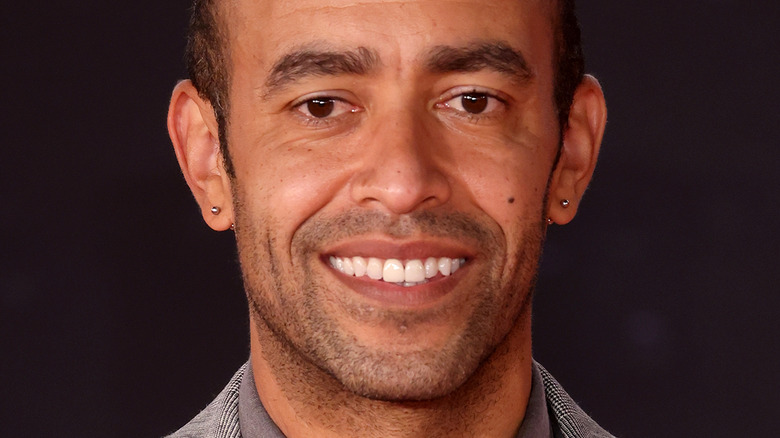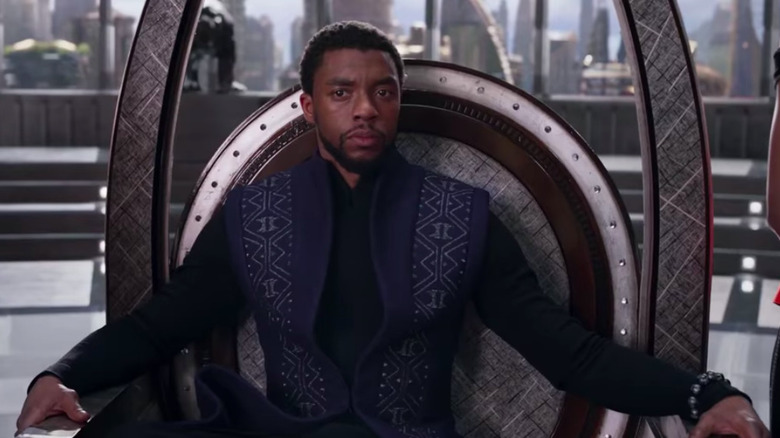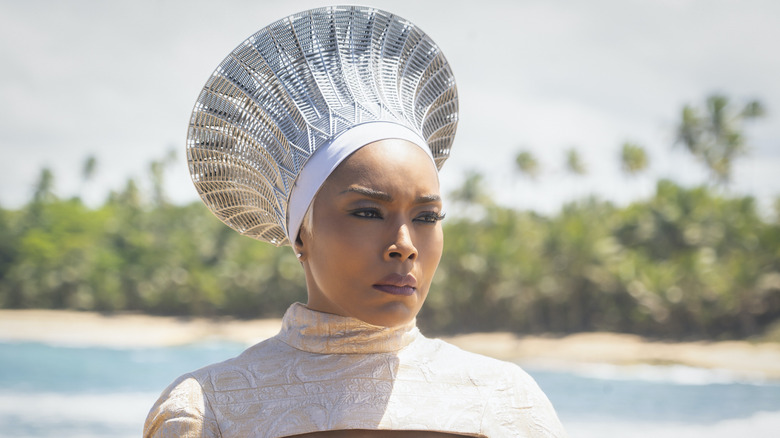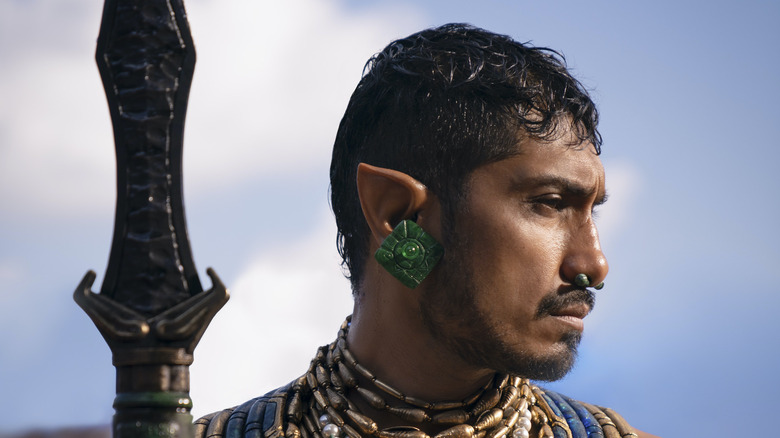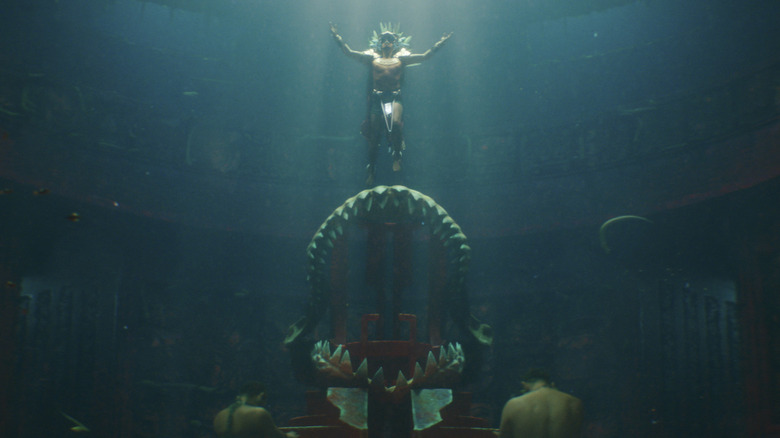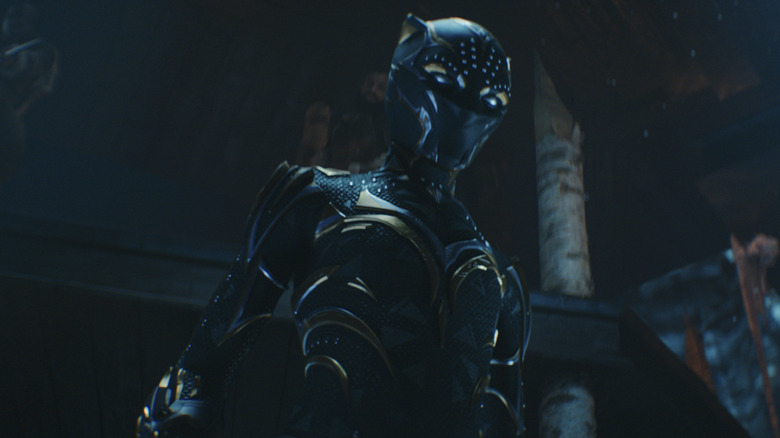Black Panther: Wakanda Forever Producer Nate Moore Talks Developing The Highly Anticipated Sequel - Exclusive Interview
For Marvel Cinematic Universe fans, "Black Panther: Wakanda Forever" is among the most anticipated films of the year. Not only is it the sequel to one of the best and most popular entries in the ever-growing franchise, but it also enables fans to revisit the fascinating country of Wakanda and catch up with beloved characters, including Letitia Wright's Shuri, Danai Gurira's Okoye, and Lupita Nyong'o's Nakia. Plus, it introduces a new and intriguing antagonist in the form of Namor (Tenoch Huerta) and his mysterious underwater empire, Talokan, a world unlike anything seen before in the MCU.
More than anything, however, "Wakanda Forever" is an opportunity to mourn the untimely death of Chadwick Boseman, the actor who played the main character of "Black Panther," T'Challa, and passed away between the first and second films. Boseman and his character were beloved figures, so instead of replacing the actor, Marvel made the decision to reflect the devastating loss in the film. It's a choice that permeates the entire story, giving it an emotional weight that makes the film especially meaningful.
Helping to usher the movie to the screen is producer Nate Moore, a Marvel veteran whose credits also include "Captain America: Civil War," "Eternals," and the original "Black Panther." In an exclusive interview with Looper, Moore provided insight into the production team's approach to depicting T'Challa's death, discussed the introduction of Namor, and teased the MCU's upcoming Phase Five.
Honoring the passing of Chadwick Boseman
"Wakanda Forever" is a really moving film, and the thing that's going to be on everyone's mind is the passing of Chadwick Boseman and how that impacts this film. What was the process of portraying the great loss of this character and this actor in the film in a way that allowed everyone, the audience included, to mourn?
It's exactly that. Chadwick's passing was sudden and surprising to us all, and as storytellers, you have to figure out a path forward that makes sense. We wanted to revisit Wakanda again because we knew how much it meant to audiences and to Chad, so this seemed to be a way where we could do that and still honor his passing and not skip past it.
[Director] Ryan [Coogler] and Joe Robert Cole are the co-writers who figured out a way to take what we had a little bit from the basics of the plot. We always wanted to introduce Namor and figure out a character journey for Shuri and Ramonda and all the other Wakandans who then could mourn T'Challa's passing on the screen and marry them together, hopefully, in a film that deals with [not only] grief and loss but also hope and renewal and the promise of a path forward.
Telling 'the most organic story'
There are so many beloved characters in the "Black Panther" universe, from Shuri to Ramonda to Okoye. How did you decide who got that spotlight and what stories fit where in this film?
Once we decided on telling the story of T'Challa's passing, [we asked], who would be most touched organically by that passing? If you think about Shuri, for instance, here's a woman who her entire life had lived with her brother. He's her older brother, so since she was born, this man was by her side. So his passing would touch her and Ramonda the most deeply. And then you ripple out from there.
Okoye had a great relationship with him, Nakia had a romantic relationship with him, and M'Baku had an adversarial-turned-brotherly relationship with him. You tell the most organic story to the people who were closest to the man. And if the movie works, that's why, because hopefully, it doesn't feel artificial in how we're dealing with the grief; it feels [like] a natural outgrowth of the first film.
Introducing Namor
As you mentioned, the antagonist in this film is Namor. That's a huge addition to the MCU. Why was now the right time to introduce him?
It was an idea Ryan had even in the postproduction process of the first film, once we realized the world of Wakanda could be this powerful. In publishing, Namor and the world of Atlantis and Wakanda had often found themselves at odds. Thematically, Ryan continues to be interested in the themes of colonization and how that affects people. By anchoring Namor and the Talokan people in the legacy of Mayan culture, both past and present, he was able to tell a story, again with Joe Robert Cole, that juxtaposed Wakanda, a nation that had never been colonized, with the Talokan people, a nation that had fled colonization to such an extreme that they had to build an underwater kingdom to remain free.
That thematically makes Namor and Talokan a really good foil to Wakanda because their experiences are so different. The way they look at the world is different. But their goals are the same, which is to do the best by the people that they rule. It seemed like the right story to tell.
Portraying Indigenous Mayan culture
It's a fascinating introduction of this completely new culture. Just like Wakanda, it seems so rich, so interesting, and it's a culture that's rooted in Indigenous Mayan culture. What were the decisions that went into bringing that portrayal onto the screen?
It was, again, thematically, what cultures had experienced this brush with colonization? There's probably more [such cultures] than we all want to think about, but the Mayan culture is incredibly rich, both visually [and] culturally. From a linguistic standpoint, the characters in the film are speaking Yucatec Mayan.
Once you make that decision, it's about getting all those details and making sure you're consulting with the right people so that it does feel like a love letter to Mayan and Mesoamerican culture, the same way that Wakanda, I would argue, feels like a love letter to the African cultures that inspired it. You want both of those things to be equally rich because it's not about importance, but whenever you're dealing with real cultures, it's our job as storytellers to portray them in a way that feels authentic.
A lot of people will probably be really enchanted by this world. Is there any chance we're going to see more in movies or maybe a Disney+ show?
There [are] certainly more stories to tell in the world of Talokan, so this will not be the last time you see them or Namor. I hope people do respond to that and [not only] want to see more of them but also be curious enough about Mayan culture to see the real-world version of it.
Hinting at what's to come
This is the last movie in the MCU's Phase Four. Is there anything you can tease going into Phase Five?
No, not without ruining anything, but I would say Phase Four is very much about loss and renewal. At the end of "Endgame," even, you lose Tony Stark, you lose Steve Rogers. There's a little bit of the feeling of the passing of a baton to a whole new generation, and some of that is because of loss, and some of that is because of renewal.
[At] the end of this movie, hopefully, not only are you introduced to an incredible new world in Talokan and Namor, but we have a new Black Panther that will carry on the mantle in the same way that Kate Bishop can carry on the mantle of Hawkeye, in the same way that Sam Wilson can carry on the mantle of Captain America. That gets us really excited, and I think you'll see a lot more of these characters moving forward.
Is there a "Black Panther 3" in the works?
We never want to count our chickens before they hatch. For us, it's the drive towards the next month of getting the movie out and seeing audiences' responses because that's who we're making these films for. Hopefully, audiences tell us they want to see more of Wakanda, and if that's so, I'm sure we won't disappoint them.
"Black Panther: Wakanda Forever" opens in theaters on November 11.
This interview has been edited for clarity.
